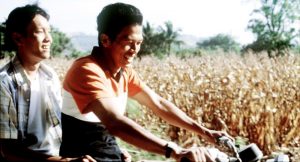Screening Tuesday November 29 at 7pm
Emerging as a cinematic tour de force of the Thai New Wave, Apichatpong Weerasethakul’s seminal film Tropical Malady is a deeply moving and aesthetically sublime study of human sexuality, Eastern mythos and personal identity. Through his highly unorthodox narrative structure and beautifully twisted visual design, Weerasethakul’s film seeks to amalgamate the corporeal acts of human intimacy and the metaphysical concepts of divine agape and spiritual transfiguration, thus forging palpable links between several important, pneumatic thresholds that separate the profane and sacred planes of our daily experience.
The anthropocentric aspiration to dissociate the nature of Man from the enigmatic otherness of the ‘wild animal’ is both addressed and challenged through Weerasethakul’s complicated psychological exploration of the profoundly passionate relationship between a young soldier, Keng (Banlop Lomnoi), and a local country boy, Tong (Sakda Kaewbuadee). Desperate to escape the patriarchal military environment that purports moral impropriety through obscene gestures of violence and disconcern–emphasized in the opening scene where we see soldiers boisterously photographing a nearby corpse–Keng anchors his desires for social freedom in the innocent figure of Tong. The film follows these men through populous urban settings and seclusive jungle wildernesses, illustrating the ways in which they shift between their conventional social realities and chimerical fantasy worlds, aspiring to transcend the physical boundaries of material existence.
What distinguishes this unconventional romance from other epic pieces of New Wave cinema is not the emotional development or unorthodoxy of Keng and Tong’s relationship; rather the secret of Weerasethakul’s genius lies in his project’s panoramic design. Weerasethakul’s multi-dimensional investigation of the insatiable nature of human desire takes viewers through a sporadic and highly experimental narrative trajectory. For the first half of the film, Keng and Tong’s budding relationship is approached through the genre of cinematic naturalism. The film’s dark, mysterious mise-en-scene, dream-like set designs, and well-timed edits (including unbelievably creative cuts that beautifully capture the temporal and spatial movements of the protean woodland environment, instantaneously moving from day to night, from downpours to desiccated landscapes) help to render palpable the intimate dramas, external turmoils, and inner psychologies of the male leads. However, in the middle of the film, after Tong’s strange and abrupt disappearance, a new story ensues; Keng superimposes himself into the village’s local mythology and sets out to hunt a tiger spirit that dwells in the heart of the forest. Keng embarks on this onerous journey of physical and psychical importance in order to re-capture his elusive partner, who has slipped away into a spiritual plane of existence.
The universal significance of this quest transcends sexual, racial and cultural barriers, offering audiences powerful insights into the psychosomatic dynamics that work to unify the realms of body and soul–more specifically, of humanhood and animalism. Ultimately, Keng’s pilgrimage is a journey in and through the self, wherein the protagonist is forced to push his potentialities in order to survive, thus reconvening with the instinctual animal traits that have been violently repressed by the simultaneous weight and ease of societal superstructures. In this mythical realm, viewers are exposed to the most primal vicissitudes of human nature that rest impatiently at the core of our compulsions, actions and drives. Hallucinatory experiences involving talking baboons and carnivorous beasts maliciously attack Keng’s fracturing psyche until he inevitably succumbs to the savage pressures of the wilderness that surrounds him. Keng’s final apotheotic confrontation with the ephemeral tiger ends in a solemn, and rather poetic, moment of spiritual rebirth. Tong, in his beastial form, gazes upon his pursuer as Keng slips into the ethereal impalpability of the wild. With the final phrase, “I miss you, soldier,” Tong touches the core of Keng’s frustrations, while offering him the alternative possibility of a fresh start. In this instance, Keng is implicitly asked to abandon his former social ties and to engage fully in a new romantic reality, set in the fantastic foliage that circumambulates the two lovers.
Weerasethakul has created an immensely important, extraordinarily eccentric, and deeply difficult film; a work of art that provides audiences with a unique interpretation of human experience that takes a radically different approach to conventional and unconventional forms of sexual difference. Through Weerasethakul’s philosophical lens, sexuality operates outside of social categories and traditional archetypes. It simply exists as a physical and spiritual medium through which one can gain access into his or her most innate, instinctual drives; through the radical and uncontrollable emotional effects of human passion, an individual tangentially scrapes the wild walls that exist beneath our socio-cultural exteriors. There is an ineluctable interplay between the physical and mental passions that can only be uncovered through the violent shattering of surrounding ideologies and the radical embrace of humanhood. We must accept what we are: the good, the bad, and the Real.
Dante Fresse is a third year student at Bucknell University who is pursuing a double major in Film/Media and Literary Studies. He is the current President of the Bucknell Film Club and Literary Studies Club. Dante also works as an editor for the Bucknell Humanities Review and is an active writer for the online political journal, The Rival, and ETC Magazine, a campus publication that engages creatively and critically with contemporary cultural and social topics that are concerned or affiliated with the arts and humanities. He is a member of the campus fraternity Sigma Phi Epsilon and the Sigma Delta Tau English Honors Society.
